 Libri di Jean-Luc Nancy su Unilibro.it
)
Libri di Jean-Luc Nancy su Unilibro.it
)
|
|
2002 |
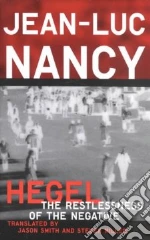 Title :
Hegel
Title :
HegelAuthor: Nancy Jean-Luc Publisher: Univ of Minnesota Pr € 24,40
|
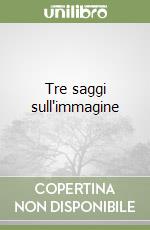 Title :
Tre saggi sull'immagine
Title :
Tre saggi sull'immagineAuthor: Nancy Jean-Luc Publisher: Cronopio € 9,00
|
 Title :
Un pensiero finito
Title :
Un pensiero finitoAuthor: Nancy Jean-Luc Publisher: Marcos y Marcos € 15,00
|
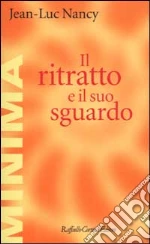 Title :
Il ritratto e il suo sguardo
Title :
Il ritratto e il suo sguardoAuthor: Nancy Jean-Luc Publisher: Raffaello Cortina Editore Attraverso l'esame di alcune tele che hanno segnato la storia della pittura (da Lotto a Matisse), il filosofo Jean-Luc Nancy ci porta di fronte a quell''oggetto' misterioso che compare nel ritratto e attorno al quale si organizza tutto lo spazio pittorico: lo sguardo. E' lo sguardo a 'esporre' il soggetto in pittura e a presentarlo al nostro stesso sguardo. Giocando con la somiglia, la seduzione del ritratto sta nel suo modo di richiamarci a sé facendoci vedere ciò che non può essere visto. In queste pagine quindi il filosofo rimette in gioco la definizione del ritratto e il suo senso, aprendo nuovi percorsi tra arte e filosofia. € 9,80
Scontato: € 9,31
|
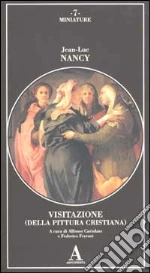 Title :
Visitazione (della pittura cristiana)
Title :
Visitazione (della pittura cristiana)Author: Nancy Jean-Luc; Cariolato A. (cur.); Ferrari F. (cur.) Publisher: Abscondita 'La Visitazione è un soggetto relativamente poco trattato rispetto all'Annunciazione di cui potrebbe essere il complemento naturale, per non parlare ovviamente della nascita e dell'infanzia di Gesù [...] Nella Visitazione il divino resta celato e cifrato, ed è proprio questa dissimulazione o questo ritiro, questa assenza a costituire la manifestazione stessa [...] Dal punto di vista teologico la Visitazione non ha una particolare importanza. Ma dal punto di vista dell'arte, enuncia una verità di fondamentale importanza: quando l'arte era religiosa, non si identificava mai senza resto al religioso. Essa mescolava sempre al sacro anche il suo segreto, o anche: glielo sostituiva.' € 10,00
|
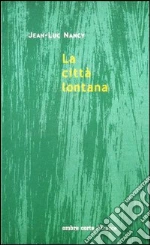 Title :
La città lontana
Title :
La città lontanaAuthor: Nancy Jean-Luc; Di Vittorio P. (cur.) Publisher: Ombre Corte € 7,50
|
 Title :
Il c'è del rapporto sessuale
Title :
Il c'è del rapporto sessualeAuthor: Nancy Jean-Luc; Fanfoni A. (cur.) Publisher: SE € 10,00
|
||
|
2001 |
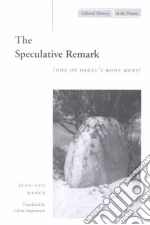 Title :
The Speculative Remark
Title :
The Speculative RemarkAuthor: Nancy Jean-Luc, Surprenant Celine (TRN) Publisher: Stanford Univ Pr This work, by one of the most innovative and challenging of contemporary thinkers, pivots on a Remark added by Hegel in 1831 to the second edition of his Science of Logic. As a model of close reading applied both to philosophical texts and the making of philosophical systems, The Speculative Remark played a significant role in transforming the practice of philosophy away from system building to analysis of specific linguistic detail, with meticulous attention to etymological, philological, and rhetorical nuance. Nancy uses his extended examination of the Remark to delineate certain overall strategies in several Hegelian texts that militate for language-oriented readings of Hegel, as shown in Nancy's redefinition of such key terms as Aufhebung, mediation, and speculation. Nancy's reading progresses from speculative words and propositions to registering the speculative itself. While he avoids analyzing Hegel's system as such, Nancy reconstructs the Hegelian trajectory on a basis of tropes, building from propositions rather than structures, elements, and cycles. The overview that emerges in the final chapter and epilogue constitutes a broad statement about Hegel's practice and significance, one nuanced by close attention to his deployment of rhetoric and linguistic play. The Speculative Remark thus furnishes a model for a theoretically aware approach to all systematic philosophy, while providing a significant historical contribution to the evolution of contemporary critical theory. € 23,40
|
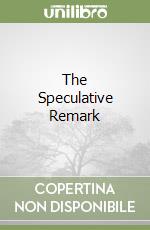 Title :
The Speculative Remark
Title :
The Speculative RemarkAuthor: Nancy Jean-Luc, Surprenant Céline (TRN) Publisher: Stanford Univ Pr € 53,80
|
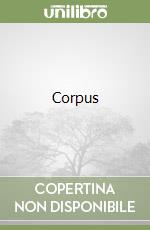 Title :
Corpus
Title :
CorpusAuthor: Nancy Jean-Luc; Moscati A. (cur.) Publisher: Cronopio € 8,26
|
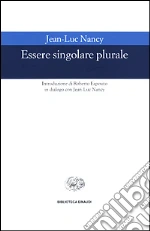 Title :
Essere singolare plurale
Title :
Essere singolare pluraleAuthor: Nancy Jean-Luc Publisher: Einaudi In questo testo lo sguardo dell'autore si rivolge alla costituzione della realtà, nella sua forma singolare e plurale. Quello che la tradizone filosofica ha chiamato 'essere' non è che la relazione originaria attraverso cui le singole esistenze si incrociano in un nodo comune. A partire da questo presupposto il libro di Nancy si presenta non come un trattato sistematico bensì nella forma di un'interrogazione profonda e radicale della nostra contemporaneità: dei suoi bagliori e delle sue rovine, dei suoi idoli e delle sue potenzialità. Dal dispiegamento della tecnica alla società dello spettacolo, dalla mondializzazione alla metamorfosi dei corpi, dalla fuga del senso alle sue nuove configurazioni. Introduzione di Roberto Esposito. € 19,00
|
||
|
2000 |
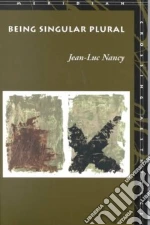 Title :
Being Singular Plural
Title :
Being Singular PluralAuthor: Nancy Jean-Luc Publisher: Stanford Univ Pr This book, by one of the most innovative and challenging contemporary thinkers, consists of an extensive essay from which the book takes its title and five shorter essays that are internally related to ?Being Singular Plural.” One of the strongest strands in Nancy's philosophy is his attempt to rethink community and the very idea of the social in a way that does not ground these ideas in some individual subject or subjectivity. The fundamental argument of the book is that being is always ?being with,” that ?I” is not prior to ?we,” that existence is essentially co-existence. Nancy thinks of this ?being-with” not as a comfortable enclosure in a pre-existing group, but as a mutual abandonment and exposure to each other, one that would preserve the ?I” and its freedom in a mode of imagining community as neither a ?society of spectacle” nor via some form of authenticity. The five shorter essays impressively translate the philosophical insight of ?Being Singular Plural” into sophisticated discussions of national sovereignty, war and technology, identity politics, the Gulf War, and the tragic plight of Sarajevo. The essay ?Eulogy for the Mêlée,” in particular, is a brilliant discussion of identity and hybridism that resonates with many contemporary social concerns. As Nancy moves through the exposition of his central concern, being-with, he engages a number of other important issues, including current notions of the ?other” and ?self” that are relevant to psychoanalytic, political, and multicultural concepts. He also offers astonishingly original reinterpretations of major philosophical positions, such as Nietzsche's doctrine of ?eternal recurrence,” Descartes's ?cogito,” and the nature of language and meaning. € 26,20
|
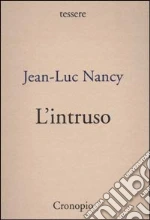 Title :
L'intruso
Title :
L'intrusoAuthor: Nancy Jean-Luc; Piazza V. (cur.) Publisher: Cronopio Raccontando per la prima volta l'esperienza vissuta del suo trapianto cardiaco, l'autore si interroga sulle trasformazioni che le categorie di identità e di estraneità subiscono quando il corpo entra nel regno della biopolitica. E la vita e la morte, separate ormai da una parete sottilissima, fanno continuamente incursione l'una nel terreno dell'altra. 'L'intruso' è seguito da un'intervista inedita. € 6,20
|
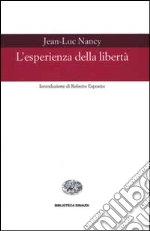 Title :
L'esperienza della libertà
Title :
L'esperienza della libertàAuthor: Nancy Jean-Luc Publisher: Einaudi Il libro più importante e classico del filosofo francese, una riflessione serrata sul significato del concetto di libertà e dell'identità dell'uomo in quanto soggetto della comunità umana e sociale. La libertà non è un valore, un'idea, un concetto; essa è un'esperienza o una decisione di esistenza. Nancy resta fedele alla concezione kantiana della libertà come fatto, contemporaneamente si confronta con i filosofi novecenteschi della libertà - da Arendt a Adorno, da Sartre a Bataille - pervenendo infine a ricostuire il nesso tra libertà e comunità. L'intento del saggio è quello di sottomettere la filosofia al rigore della prova empirica, calandola nella vita reale e connettendola ai fatti e all'esperienza quotidiana di tutti. € 16,53
|
|
1999 |
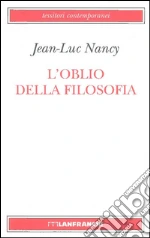 Title :
L'oblio della filosofia
Title :
L'oblio della filosofiaAuthor: Nancy Jean-Luc; Ferrari F. (cur.) Publisher: Lanfranchi Il nostro tempo, nel campo del pensiero. Si dice che occorre uscire da una 'crisi' o da uno sviamento che dura ormai da venti o trent'anni. Come se la ricerca, la sperimentazione, l'invenzione fossero malsane. Si dice che la filosofia deve ritornare al senso dell'uomo, ai valori, al soggetto, come se questi significati non si fossero esauriti con l'esaurirsi generale della metafisica del significato. Non si fa 'ritorno' a nulla né a Dio, né a Kant, né ai Valori. Esiste certo una questione del senso: ma essa è davanti a noi, sempre a venire e da pensare. € 18,00
|
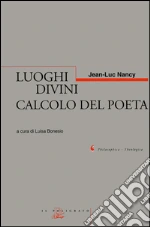 Title :
Luoghi divini. Calcolo del poeta
Title :
Luoghi divini. Calcolo del poetaAuthor: Nancy Jean-Luc; Bonesio L. (cur.) Publisher: Il Poligrafo € 13,00
|
|
1998 |
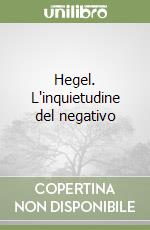 Title :
Hegel. L'inquietudine del negativo
Title :
Hegel. L'inquietudine del negativoAuthor: Nancy Jean-Luc Publisher: Cronopio € 12,00
Scontato: € 11,40
|
|
|
1997 |
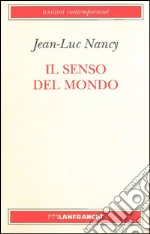 Title :
Il senso del mondo
Title :
Il senso del mondoAuthor: Nancy Jean-Luc; Ferrari F. (cur.) Publisher: Lanfranchi Questo volume raccoglie infatti le fila di tutta la sua produzione precedente per rileggerla alla luce di quella condizione esistenziale, tipica del nostro tempo, che è la mondialità. Qual è il senso di questo nostro mondo? Che senso ha la mondializzazione del mondo? Esiste ancora il bisogno di una donazione di senso? O non è forse in noi, in ognuno di noi, che, ogni volta di nuovo, tutta la questione del senso è rimessa in gioco? E allora, come stare in questo mondo? Come praticare la politica, l'economia, l'arte, la psicanalisi, la musica? E come guardare ai nostri sensi, al nostro desiderio e alla nostra sofferenza? Questo libro esemplare, arricchito per l'edizione italiana da uno scritto inedito, si espone alla singolarità di queste domande, nelle quali si configura il senso del mondo. € 20,00
|
|
|
1996 |
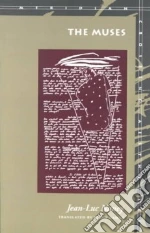 Title :
The Muses
Title :
The MusesAuthor: Nancy Jean-Luc, Kamuf Peggy (TRN) Publisher: Stanford Univ Pr ?A truly exhilarating set of philosophical reflections on art and aesthetics. From the caves of Lascaux to Caravaggio's Death of the Virgin to the postmodern question of the marketplace and the ?end' of art, Nancy masterfully explicates the threshold role art plays in the philosophical distinctions between the sensory and the sensible, life and death, presentation and representation. Art is also compellingly shown to be the foundational category for any concept of religion, technology, or even ?humanity.'” ?Georges Van Den Abbeele, University of California, Davis This book, by one of the most challenging contemporary thinkers, begins with an essay that introduces the principal concern sustained in the four succeeding ones: Why are there several arts and not just one? This question focuses on the point of maximal tension between the philosophical tradition and contemporary thinking about the arts: the relation between the plurality of the human senses?to which the plurality of the arts has most frequently been referred?and sense or meaning in general. Throughout the five essays, Nancy's argument hinges on the culminating formulation of this relation in Hegel's Aesthetics and The Phenomenology of Spirit?art as the sensible presentation of the Idea. Demonstrating once again his renowned ability as a reader of Hegel, Nancy scrupulously and generously restores Hegel's historical argument concerning art as a thing of the past, as that which is negated by the dialectic of Spirit in the passage from aesthetic religion to revealed religion to philosophy. In the book's second essay, Nancy reads what he calls Hegel's ?secret” (a secret even from Hegel): the emergence of art as presentation rather than representation. This intricate and compelling reading is key to the remaining essays: a virtuoso reading of Caravaggio's Death of the Virgin; an analysis of a traced hand in the grotto of Lascaux as the essential mimetic gesture, the monstration of self outside of self; and an account of the contemporary situation of art, including the question whether art today is still art. Nancy is among the very few present-day thinkers who ask rigorous and sustained questions about art and the practice of thinking about art. Meridian: Crossing Aesthetic € 27,60
|
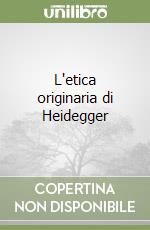 Title :
L'etica originaria di Heidegger
Title :
L'etica originaria di HeideggerAuthor: Nancy Jean-Luc Publisher: Cronopio € 5,16
|
|
1995 |
 Title :
La comunità inoperosa
Title :
La comunità inoperosaAuthor: Nancy Jean-Luc Publisher: Cronopio € 12,91
|
 Title :
L'essere abbandonato
Title :
L'essere abbandonatoAuthor: Nancy Jean-Luc Publisher: Quodlibet € 10,50
|
|
1994 |
 Title :
The Experience of Freedom
Title :
The Experience of FreedomAuthor: Nancy Jean-Luc, McDonald Bridget (TRN) Publisher: Stanford Univ Pr The most systematic, radical, and lucid treatise on freedom that has been written in contemporary Continental philosophy, this book combats the renunciation of freedom attested in modern history by articulating the experience of freedom at work in thought itself. € 27,60
|
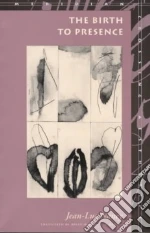 Title :
The Birth to Presence
Title :
The Birth to PresenceAuthor: Nancy Jean-Luc, Holmes Brian (TRN) Publisher: Stanford Univ Pr The epoch of representation is as old as the West. Indeed, representation is the West, understood as what at once designates and expands its own limits. But what comes after the West? What comes after representation's disclosure of its own limit? The central problem posed in these essays, collected from over a decade of work, is how in the wake of Western ontologies to conceive the coming, thebirth that characterizes being. We are now at the limit of representation, where objects as we experience them have been show to be merely objects of representationor rather, of presentation, since there is nothing to (re)present. The first part of this book, "Existence," asks how, today, one can give sense of meaning to existence as such, arguing that existence itself, as it comes nude into the world, must now be our "sense." In examining what this birth to presence might be, we should not ask what presence "is"; rather we should conceive presence aspresence to someone, including to presence itself. This birth is not the constitution of an identity, but the endless departure of an identity from, and from within, its other, or others. Its coming is not desire butjouissance, the joy of averring oneself to be continually in the state of being borna rejoicing of birth, a birth of rejoicing. The second section, "Poetry," asks: What art exposes this? In writing, in the voice, in painting? And what if art is exposed to it? How does it inscribe (or rather, "exscribe," in a term the book develops) the coming existence as such? The author's trajectory in this book crosses those of Hegel, Schlegel, Baudelaire, Nietzsche, Freud, and Heidegger, in their comments on art and politics, existence and corporeality, everyday life and its modes of existence and ecstasy. An analysis that dares this crossing involves all the varied accounts of existence, political as well as philosophical, and all the realms of poverty. € 29,90
|
|
1993 |
 Title :
La partizione delle voci. Verso una comunità senza fondamenti
Title :
La partizione delle voci. Verso una comunità senza fondamentiAuthor: Nancy Jean-Luc; Folin A. (cur.) Publisher: Il Poligrafo € 10,33
Scontato: € 9,81
|
|
|
1992 |
 Title :
Il mito nazi
Title :
Il mito naziAuthor: Nancy Jean-Luc; Lacoue-Labarthe Philippe Publisher: Il Nuovo Melangolo Questo saggio di Lacoue-Labarth e Jean-Luc Nancy tenta di delineare la genesi filosofica ed estetica del mito nazi. Dalla fine del Settecento la cultura tedesca ha cercato di individuare, ora nella lingua, ora nel pensiero, ora nell'arte, il terreno sul quale costruire la propria identità nazionale alla luce di un confronto con gli altri stati europei. Gli autori mettono in luce il ruolo svolto dal richiamo costante al modello archetipo della Grecia (non solo quella classica ma della Grecia arcaica, dei miti e dei misteri oscuri e violenti) e il modo attraverso cui questo processo ha trovato lo sbocco necessario nella costruzione artificiosa del mito razzista fondato sulla parola d'ordine «terra e sangue». € 5,16
|
 Title :
Un pensiero finito
Title :
Un pensiero finitoAuthor: Nancy Jean-Luc; Bonesio L. (cur.) Publisher: Marcos y Marcos 'Un pensiero finito' è un testo filosofico in cui Nancy annuncia, in tutta la drammaticità, la perdita del senso, lo smarrimento del significato del mondo e delle cose. Questo libro parla del cuore delle cose, dell'amore in schegge, di ciò che è insacrificabile, ma non propone affatto un piatto e lagnoso 'lamento sulla fine', perché l'autore addita con estrema energia quanto sia proprio il mondo stesso, nella sua sostanza, 'il senso'. Occorre riavvicinarsi a pietre e strade, passioni e desideri con la massima apertura, la massima energia, permettersi di sfiorare, prima, e far proprio, poi, il sublime. € 14,46
|
|
1991 |
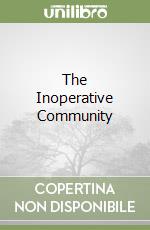 Title :
The Inoperative Community
Title :
The Inoperative CommunityAuthor: Nancy Jean-Luc Publisher: Univ of Minnesota Pr € 21,30
|
|
|
1981 |
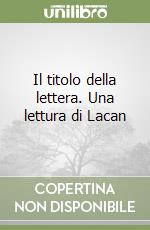 Title :
Il titolo della lettera. Una lettura di Lacan
Title :
Il titolo della lettera. Una lettura di LacanAuthor: Nancy Jean-Luc; Lacoue-Labarthe Philippe Publisher: Astrolabio Ubaldini € 5,16
|
|

|

|

|